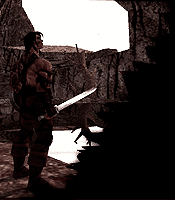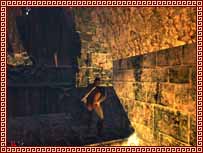 |
|
News Information Media Features Community
|
|
|
|
. . . your source for news and information on Rebel Act Studios' Severance! |
|
Severance/Blade - Hands-On Preview I've been following Severance/Blade (refered to as Blade from now on) from early in the development, and my interest for the game has only grown bigger for each day. Through the past few years I've made up a pretty clear idea of how Blade plays and what to expect from it. After seeing the last Blade mpeg I was completely hooked; my previous visions of the game was underrated. Working on Blade Universe, for about four months now, have given me even further insight. But it was not until recently, after paying Rebel Act Studios a visit and playing the game myself, I could verify my expectations. When I was there Blade was in the very last stages of development, and only small pieces remained before it was ready for Beta. Still, it is important to remember that what I was testing was work in progress and that certain things are subject to change. Also, the version I was playing was not optimized and the Blade source was changing at least two times during my short stay. User
Interface and Controls They were, at the time, still working on adjusting the controls. They are trying to minimize the amount of keys as well as working on the mouse controls. I played with the arrow keys for movement: up for walking forward, back for backwards while the left and right arrows was used for turning the character. Double-tapping the up key makes your character run. In combat-mode the left and right keys changed into strafing around the selected opponent. Besides this the most important keys are the attack, defend and action/use keys. The action key is used for picking up objects and manipulating the environment, like pulling levers, unlocking doors and etc. Other useful keys are used for jumping, dropping/throwing objects or weapons, selecting and toggling between opponents. The first thing I usually do when playing a new game is to customize the keys to fit my likings and what I am used to, so the default controls was a bit uncomfortable. However, I didn't want to spend time changing the set-up; there was more interesting things to see! When the game starts, a short, scripted, sequence plays out in the game-engine, introducing you to the plot and how you ended up there. There is a different sequence for each of the four characters. Unfortunately the version I was playing was the Spanish one and as my Spanish is extremely limited I didn't understand the dialogue in the sequence, but I enjoyed the visual part - especially the one for the dwarf, who is falling and rolling down a rocky slant. You'll have to see it; it's funny as hell! Graphics
Blade uses a portal rendering engine, so instead of using 'brushes' like most other 3d engines; the levels are 'hollowed' out from one gigantic mass. This makes it possible to create large, detailed areas - impossible to achieve with the 'brush'-based engines - without suffering in frame-rates. Moving from tight spots to wide-open areas is practically not affecting the rendering-time at all! Higher resolutions will not have a dramatic effect on frame-rates either, as it is more CPU dependent than it is on the video-card. And in high resolution, d3d mode, Blade truly shines - like a polished gem.
Picking up a torch is simply amazing! Holding the torch in your hand while walking down a corridor creates a huge silhouette of your character on the floor, walls and roof (if the roof is lowered enough). The shadow really gives you a hunting feeling, and sometimes, it scared the living shit out of me; I started swinging at my own shadow, with the torch as a weapon, in a desperate paranoia. |
||
Webdesign and graphics by Kjerand
Pedersen,
Copyright (c) 1999, 2000 Blade Universe.
All Rights Reserved.




